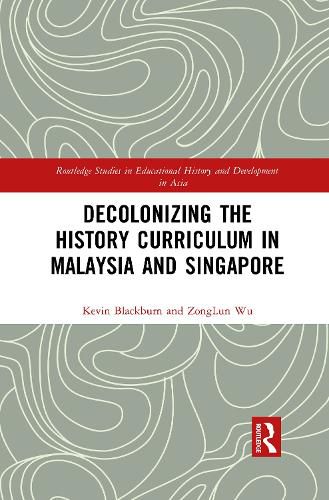Readings Newsletter
Become a Readings Member to make your shopping experience even easier.
Sign in or sign up for free!
You’re not far away from qualifying for FREE standard shipping within Australia
You’ve qualified for FREE standard shipping within Australia
The cart is loading…






Decolonizing the History Curriculum in Malaysia and Singapore is a unique study in the history of education because it examines decolonization in terms of how it changed the subject of history in the school curriculum of two colonized countries - Malaysia and Singapore. Blackburn and Wu’s book analyzes the transition of the subject of history from colonial education to postcolonial education, from the history syllabus upholding the colonial order to the period after independence when the history syllabus became a tool for nation-building. Malaysia and Singapore are excellent case studies of this process because they once shared a common imperial curriculum in the English language schools that was gradually ‘decolonized’ to form the basis of the early history syllabuses of the new nation-states (they were briefly one nation-state in the early to mid-1960s). The colonial English language history syllabus was ‘decolonized’ into a national curriculum that was translated for the Chinese, Malay, and Tamil schools of Malaysia and Singapore. By analyzing the causes and consequences of the dramatic changes made to the teaching of history in the schools of Malaya and Singapore as Britain ended her empire in Southeast Asia, Blackburn and Wu offer fascinating insights into educational reform, the effects of decolonization on curricula, and the history of Malaysian and Singaporean education.
$9.00 standard shipping within Australia
FREE standard shipping within Australia for orders over $100.00
Express & International shipping calculated at checkout
Decolonizing the History Curriculum in Malaysia and Singapore is a unique study in the history of education because it examines decolonization in terms of how it changed the subject of history in the school curriculum of two colonized countries - Malaysia and Singapore. Blackburn and Wu’s book analyzes the transition of the subject of history from colonial education to postcolonial education, from the history syllabus upholding the colonial order to the period after independence when the history syllabus became a tool for nation-building. Malaysia and Singapore are excellent case studies of this process because they once shared a common imperial curriculum in the English language schools that was gradually ‘decolonized’ to form the basis of the early history syllabuses of the new nation-states (they were briefly one nation-state in the early to mid-1960s). The colonial English language history syllabus was ‘decolonized’ into a national curriculum that was translated for the Chinese, Malay, and Tamil schools of Malaysia and Singapore. By analyzing the causes and consequences of the dramatic changes made to the teaching of history in the schools of Malaya and Singapore as Britain ended her empire in Southeast Asia, Blackburn and Wu offer fascinating insights into educational reform, the effects of decolonization on curricula, and the history of Malaysian and Singaporean education.